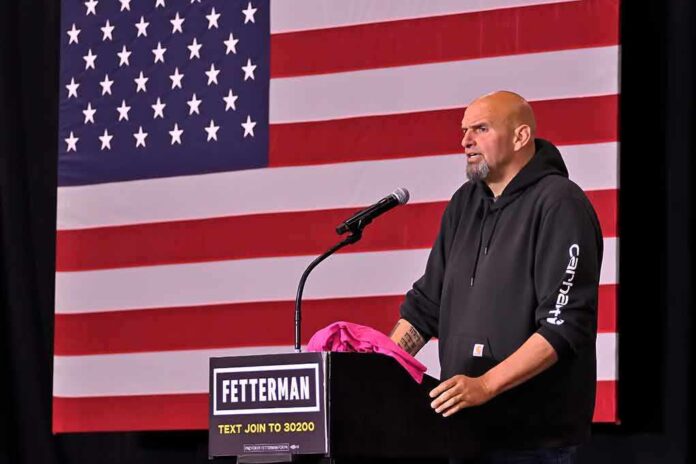Senator John Fetterman’s unexpected support for eliminating the filibuster to resolve the government shutdown signals a striking shift from traditional Democratic strategies.
Story Highlights
- Senator Fetterman advocates eliminating the filibuster to end the government shutdown.
- This stance breaks with Democratic tradition, aiming to prioritize national interests.
- The filibuster debate intensifies as government dysfunction persists.
- Fetterman’s move could reshape Senate procedural norms and party dynamics.
Fetterman’s Unprecedented Proposal
In a surprising move, Senator John Fetterman (D-PA) has publicly endorsed eliminating the Senate filibuster to break the current government shutdown. The shutdown, ongoing since October 2025, stems from a budget stalemate in Congress. Fetterman’s endorsement of the procedural change is a significant deviation from the Democratic norm, as his party has historically defended the filibuster when in the minority. This proposal could allow Republicans to pass their spending plan, highlighting Fetterman’s willingness to put “country over party” in this crisis.
The Senate filibuster, requiring 60 votes to advance most legislation, is often used by minority parties to block bills they oppose. Fetterman’s stance is notable because it empowers the opposition, a rare act of bipartisan pragmatism. It has sparked intense debate within the Democratic ranks and could influence future procedural reforms. The ongoing shutdown has disrupted federal services, leading to furloughs and economic uncertainty, pressuring lawmakers to find solutions.
Political Implications and Party Reactions
Fetterman’s position challenges the current Democratic strategy and increases pressure on party leadership. His willingness to endorse Republican efforts to bypass the filibuster could prompt other Democrats to consider similar moves, especially if the shutdown continues to impact government operations and public sentiment. The Senate leadership has yet to respond decisively to Fetterman’s suggestion, and it remains unclear if this will lead to a resolution.
Historically, similar situations have led to heated debates over the filibuster, with past government shutdowns in 2013 and 2018-2019 witnessing calls for procedural reform. While Fetterman’s proposal might end the shutdown quickly, it risks deepening partisan divides and setting a precedent for future legislative battles. The long-term implications could include an erosion of minority party rights in the Senate, altering the balance of power.
Expert Opinions and Future Considerations
Political analysts view Fetterman’s move as a reflection of growing frustration with procedural gridlock. They warn that eliminating the filibuster could have unintended consequences for Senate governance and minority rights. Reform advocates argue that the filibuster is outdated and obstructive, while traditionalists caution against weakening institutional safeguards that have historically checked majority power. The debate continues as the government shutdown persists, leaving citizens and federal workers in limbo.
Fetterman’s decision to prioritize national interests over party loyalty underscores the urgency of resolving the shutdown. As discussions continue, the potential for significant procedural changes could reshape not only the current situation but also future legislative dynamics in the Senate. The outcome of this debate will likely have lasting effects on U.S. governance and political strategies.
Sources:
Fetterman supports eliminating filibuster to break government shutdown stalemate











